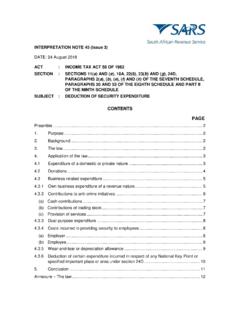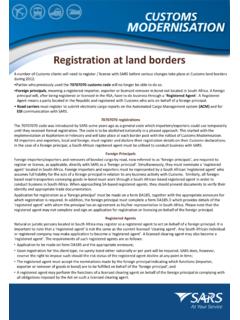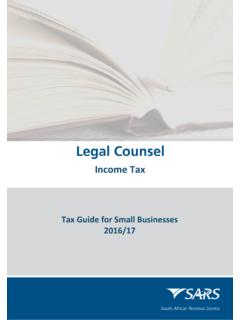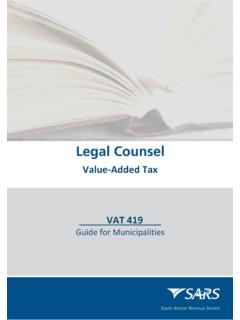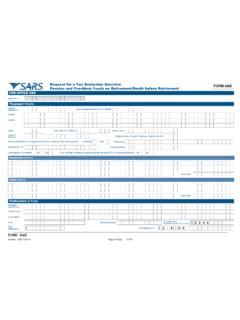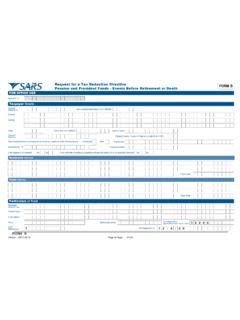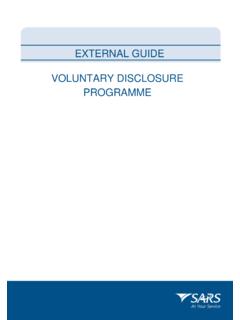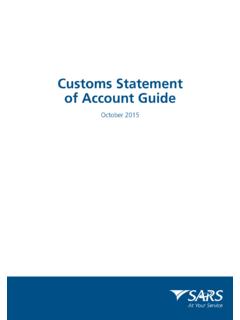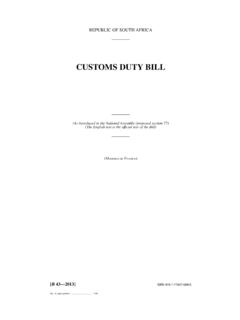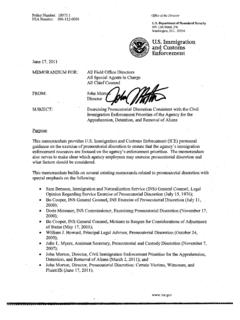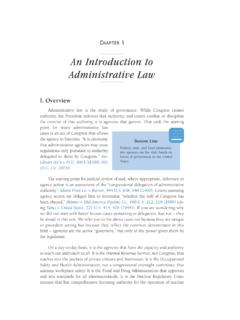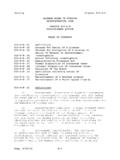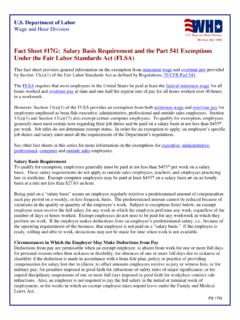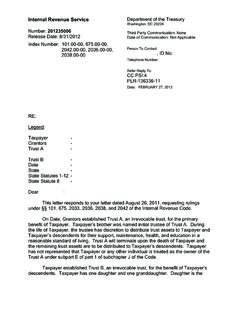Transcription of TAX ADMINISTRATION ACT NO. 28 OF 2011 …
1 INTERPRETATION NOTE: (Issue 4) DATE: 20 November 2014 ACT : TAX ADMINISTRATION ACT NO. 28 OF 2011 SECTION : SECTIONS 104 and 107 SUBJECT : exercise OF discretion IN CASE OF LATE OBJECTION OR APPEAL CONTENTS PAGE Preamble .. 1 1. Purpose .. 2 2. Background .. 2 3. The law .. 3 4. Objections .. 3 Section 104 .. 3 Factors relevant to the exercise of the senior SARS official s discretion in considering a request to extend the period in which to lodge an objection .. 5 The reasons for the delay .. 5 The length of the delay .. 6 The prospects of success on the merits.
2 6 Limitation on the extension of time to lodge an objection .. 6 Format of an application for an extension of time .. 7 Refusal to grant an extension .. 8 Periods in which to resubmit invalid objections .. 8 5. Appeal extension of the period in which an appeal against an unsuccessful objection may be lodged .. 8 6. Conclusion .. 9 Annexure A Objection process and timeframes .. 10 Annexure B The law .. 11 Preamble In this Note unless the context indicates otherwise assessment means an assessment as defined in section 1, namely, the determination of the amount of a tax liability or refund, by way of self-assessment by the taxpayer or assessment by SARS; decision means a decision referred to in section 104(2); 2 Income Tax Act means the Income Tax Act No.
3 58 of 1962; rules mean the rules referred to in section 103 which were made by the Minister, after consultation with the Minister of Justice and Constitutional Development, and published in Government Notice No. 550 in the Government Gazette No. 37819 of 11 July 2014; section means a section of the TA Act; senior SARS official means a senior SARS official referred to in section 6(3); TA Act means the Tax ADMINISTRATION Act No. 28 of 2011; taxpayer means a taxpayer as defined in section 151; and any word or expression bears the meaning ascribed to it in the TA Act.
4 1. Purpose This Note provides guidance on the factors that a senior SARS official will take into account when deciding whether to extend the period for lodging an objection under section 104(4) or an appeal under section 107(2). It also serves to highlight that the period during which an objection or appeal may be lodged is limited. 2. Background A taxpayer who is aggrieved by an assessment made on the taxpayer; or by certain decisions made under the TA Act or tax Acts,1 may object to and appeal against those assessments or decisions under the TA Act. An objection against an assessment or decision must be lodged in the manner, under the terms and within the period prescribed in the A person whose objection has been disallowed may appeal to the tax board or tax court against that outcome and in such event the appeal must be lodged in the manner, under the terms and within the periods prescribed in the TA Act and the A senior SARS official may, within prescribed limits, extend the period prescribed in the rules within which an objection or appeal must be lodged.
5 The objection and appeal procedures, which are contained in the TA Act and the rules, apply to any dispute under, amongst others, the following tax Acts4 administered by the Commissioner: Diamond Export Levy Act No. 15 of 2007 Diamond Export Levy ( ADMINISTRATION ) Act No. 14 of 2007 Employment Tax Incentive Act No. 26 of 2013 1 Section 104(2). 2 Section 104(3). 3 Section 107(1). 4 The term tax Act is defined in section 1 and means the TA Act or an Act, or portion of an Act, referred to in section 4 of the SARS Act, excluding the Customs and Excise Act.
6 3 Estate Duty Act No. 45 of 1955 Income Tax Act No. 58 of 1962 Mineral and Petroleum Resources Royalty Act No. 28 of 2008 Mineral and Petroleum Resources Royalty ( ADMINISTRATION ) Act No. 29 of 2008 Securities Transfer Tax Act No. 25 of 2007 Securities Transfer Tax ADMINISTRATION Act No. 26 of 2007 Skills Development Levies Act No. 9 of 1999 Tax ADMINISTRATION Act No. 28 of 2011 Transfer Duty Act No. 40 of 1949 Unemployment Insurance Contributions Act No. 4 of 2002 Value-Added Tax Act No. 89 of 1991 The Customs and Excise Act No. 91 of 1964 contains its own provisions relating to dispute resolution.
7 3. The law The relevant sections of the TA Act and the rules are reproduced in Annexure B. 4. Objections Section 104 A taxpayer who had the right to object or appeal against an assessment or decision under the repealed or amended provisions of a tax Act, and who was still entitled to but had not yet exercised that right before the commencement date of the TA Act, may object under the comparable provisions of the TA The periods of time run from the date that the right or entitlement first arose but subject to the provisions of the TA Act. Accordingly, if a longer period applies under the TA Act that longer period Section 104(3) stipulates the requirements for a valid objection.
8 It requires that the objection must be lodged in the manner, under the terms and within the period prescribed in the rules. An aggrieved taxpayer may, before lodging an objection, request the reasons for the assessment as provided for under rule 6(1). Under rule 6(2) this request must be in the prescribed form and manner; specify the taxpayer s delivery address; and be delivered to SARS within 30 days from the date of 5 Section 269(5). 6 Section 269(5). 7 See Annexure B for the definition of date of assessment.
9 4 Rule 7 deals with objections and, more specifically, provides the manner and terms for lodging a valid objection. Rule 7(1) deals with the timing of the objection and provides that a notice of objection must be delivered to the Commissioner within 30 days after the date of the assessment or decision when no reasons for the assessment are requested by the taxpayer; the delivery of a notice by SARS under rule 6(4) stating that adequate reasons for the assessment had been provided; or the delivery of a notice by SARS providing the reasons for the assessment as requested by a taxpayer under rule 6.
10 A day , as defined in rule 1, means a business day as defined in section 1 of the [TA] Act . A business day is defined in section 1 as a day which is not a Saturday, Sunday or public holiday, and for purposes of determining the days or a period allowed for complying with the provisions of Chapter 9, excludes the days between 16 December of each year and 15 January of the following year, both days inclusive; . Since day in the rules means a business day as defined in the TA Act, business day will be used for purposes of this Note. An objection that is not lodged within the time limit of 30 business days is an invalid objection.
